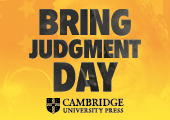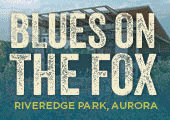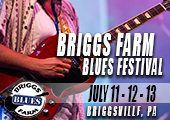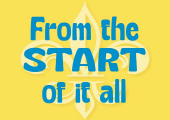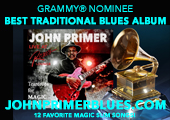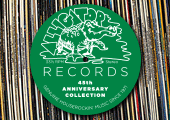KIRK FLETCHER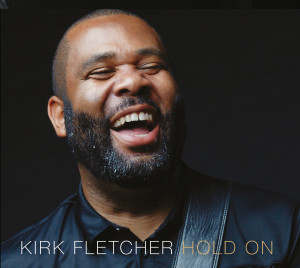
Hold On
Elaysia – KF 270137
Kirk Fletcher has made a personal statement on his newest album, simply titled Hold On. In what he says feels like his first solo record, the eight tracks represent his first attempt at writing all-original music, and, in my opinion, he succeeds well beyond the average, even if the album is relatively short, clocking in at only 48 minutes.
The disc opens with a gargling organ and a snappy Albert Collins–style Tele sound on Two Steps Forward. The song has a funky modulation that occurs right after the first verse, and a stinging Stevie Ray Vaughan–flavored guitar pushes forward. Mahalia Barnes provides gritty vocals as a supporting cast member, while Kirk fires ripping, Hendrixian wah-wah fuzz licks that sound delicious. Somewhere before the tune is over, he actually quotes the Layla melody briefly—a nice treat tucked in there for those who habitually listen closely and scrutinize every note in a gunslinger’s guitar solo.
You Need Me has a funky, churchy feel that will definitely make your body move in the pews. Although Kirk is a preacher whose sermon seems to be a short message delivered in under four minutes (with only one verse and chorus), he leaves the remainder of the tune to indulge in swapped guitar licks that vacillate between a straight sound and clean wah-wah licks, while a third guitar part serves as the rhythm guitar that glues the other two together.
Sad Sad Day is anything but sad; quite the opposite—it’s a highly energized New Orleans second line boogie, with a Chicago blues riff that drives the tune in a patented Jimmy Reed–meets–Hound Dog Taylor mash-up. There’s a ton of fun listening to this one—it even has no bass, just a nasty guitar shuffle and stinging leads with New Orleans–style drums and dirty boogie-woogie piano. Fletcher’s lead solo is so raw I can’t get enough. I absolutely love this track for its unabashed wickedness, and I’d sell pop bottles to see this one performed live!
Things immediately get turned down to a slow boil on The Answer when Fletcher sings in an Albert King–style falsetto, and plays such a tender guitar solo that demonstrates his gentle touch and gorgeous tone. “I wish I had a mother, I wish I had a wife, I work so hard to make it through this life . . . what can it be?” he asks, as he searches the whole world for the answer. It’s a beautifully poignant tune that will move you. The tone on his Telecaster solo is flat-out ripping, and he sounds like he is testifying—one of the best guitar lectures anyone could have ever laid down on wax.
Time’s Ticking is an all-out rocker that has Matt Brown’s drums marching in half step as he marks the time, which does, in fact, slowly tick away as Kirk delivers yet another aural assault. This dude is realty out to do some damage—this guitar solo may be even more blistering than the last one!
Dupree has a really catchy melody—it’s a spunky-funky instrumental with an infectious groove and percolating romp that eventually gives way to a sassy New Orleans organ solo that’ll make you yell, “hey pocky way!” Kirk’s elegant solo just sounds like he’s having a ball casually tossing off the numerous syncopated riffs over this Crusaders-flavored treat that ends in a funky clavinet cascade. This song is clearly dedicated to guitarist Cornell Dupree in a long-forgotten but legendary East Coast jazz-funk band called Stuff. Most people might not remember that group, but they were insanely groovalicious. Kirk does a fabulous job of tapping into Cornell and Eric Gale throughout this track as well as the entire album.
Gotta Right has so many of my favorite elements: minor blues shuffle in the tempo and style of Albert King’s I Wanna Get Funky. Oh my goodness, this Fletcher tune is a barn burner—this man knows how to build a house and tear it down like nobody’s business. The closer, Hold On, is a beautiful soul ballad with lovely background female harmonies by Jade McCrea—a torch song for sure. And yet again, Fletcher builds a slow, simmering solo up to a burning flame before dousing it out with a last vocal phrase.
I can’t remember the last time I reviewed a disc that blew me away with every single track, having absolutely no “filler” material detected on either end. This is one of those times. I reviewed a previous album by this artist and was impressed, but this one is head and shoulders above anything else I have heard from Fletcher.
Engineers Nick Dover and Alan Hertz deserve a shout-out for doing an incredible job of capturing superb sonics on this disc. Throughout the entirety of Hold On, Kirk Fletcher is shredding somethin’ awful on this album—he’s a bad, baad boy.
—Wayne Goins
ERIC BIBB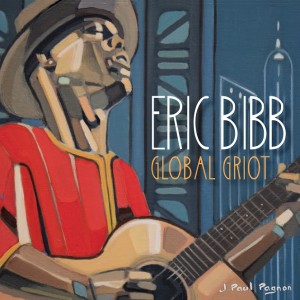
Global Griot
Stony Plain Records – SPCD 1402
It would be no exaggeration to call Eric Bibb one of the most relevant and significant performers in the blues genre today. His most recent album, the Grammy-nominated Migration Blues, was a poignant, powerful testament to roots and blues as a vibrant contemporary music with a significant message and artistic prowess. As highlighted in the recent issue of LB, the blues today has something to say, now more than ever, and the indomitable Bibb is one of the songwriters on the forefront of the revival of blues as a form of sociopolitical, philosophical thematic. As a musical universalist, his cross-cultural musical adventures and enlightened humanistic, globalist outlook embodies the old adage “music is a unifying force.” As he says in his lyrics, “. . . hoisting the banner of humanity / hoisting the banner of love.” He tears down walls—of race, ethnicity, religion and national boundaries, in direct resistance to those who divide.
Global Griot is a brilliant double album, a beautiful, seamless blend of blues, folk and world music that again connects Bibb with his Malian friend Habib Koité, with whom he recorded Brothers in Bamako. They are joined by kora player Solo Cissokho and bluesman Harrison Kennedy on this journey about the griots, which Bibb aptly describes: “Connecting to the West African tradition of storytelling and oral history through music, this album features brothers and sisters from around the globe—serving the listeners a tasty gumbo, spiced with hope for these challenging times.” This collaboration works as the musicians fit together wonderfully, creating a musically perfect amalgam playing “. . . sweet songs of mercy where the cornerstone of the temple be love.”
The album is a balance of socio-critical songs, juxtaposed against those of genuine hope for an enlightened humanity. The potent Brazos River Blues is a stunning deep blues song about the racial violence, exploitation and lynching in Brazos County, Texas: “You ought to’ve been here in 1904 / you can find a dead body in every row / You ought to’ve been here in 1910 / They drive the women just like the men.” The socio-critical We Don’t Care confronts greed, apathy and self-serving attitudes of privilege: “The gap is getting wider between the rich and the poor / we got everything we need but we still want more / We don’t care.” They cover Big Bill Broonzy’s famous Black, Brown and White. Likewise, Race and Equality provides guidance of how to deal this hard issue. What’s He Gonna Say Today puts Trump in his place. Whenever the Africans sing, a spurt of joy pervades. By the time you get to CD 2 everything else in life fades into the background, as these songs engulf you in the thrill of it all.
The spirit of this album is best summarized in Human River: “I was born to sing the songs of my people / travel the world around / Destined to see myself in everyone, black, or white or yellow or brown / born to spread the message of love.” Bibb uplifts, challenges, evokes thought and holds on to higher ideals, singing embracing, idealistic, yet poignant songs in a “needed time.” Global Griot is at once moving and emancipatory, just what this mean old world needs told today: “You got a story, I got mine / We put them together made them rhyme / All because I got a friend in you / Let us finally agree that everyone is a child of God / respected equally . . .” All that in a mesmerizing musical groove, passionate, funky, soulful . . . and brave.
A true musical masterpiece.
—Frank Matheis
KENNY “BLUES BOSS” WAYNE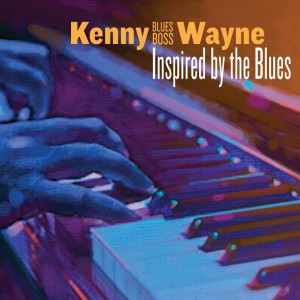
Inspired by the Blues
Stony Plain – SPCD 1401
The contemporary blues recording scene is highly guitar-centric, so it is a pleasure to have a keyboard man like Kenny “Blues Boss” Wayne assert himself and step to the foreground with a series of albums from Stony Plain Records. Inspired by the Blues, his fourth offering from the label, finds him excelling as a composer of original material and paying homage to keyboard kings from the past that inspired him.
Harmonica great Billy Branch lends a hand on two tracks, the slow-rolling, autobiographical boogie I Knew I’d Be Playing the Blues and That Girl Needs Help with its Muddy Waters–evoking groove. They just don’t make harmonica players like Branch anymore, and his interplay with Wayne elevates both these tracks. That Raggedy Shack brings to mind Louis Jordan’s ebullient jump blues, providing an opportunity for saxophonist Dave Babcock to stretch out. Wayne highlights his skills on organ and delivers a funky Billy Preston–style take on How ’Bout That, an American Dream narrative salute to a grandfather who rose up from slavery. Jimmy and Johnny is a jumping ballad that tells the tale of a love triangle that allows Wayne to showcase his Chicago blues piano chops and gives a nod to Floyd Dixon. Wayne heads down to New Orleans and delivers the Huey “Piano” Smith–derived Start Rockin’.
The pianist and singer demonstrates his affinity for Ray Charles with the bouncy original I Like That Woman and a live version of Georgia on My Mind that was recorded with a local band when he was on tour in Mexico, a performance that highlights how emotive he can be as a singer. His other direct homage is the original Mr. Blueberry Hill that pays tribute to Fats Domino by employing the hallmarks of his classic Imperial hits. One of the most outstanding tracks on the album is the instrumental Lake Country Boogie, with its wailing saxophone and stunning boogie runs on the piano riding on top of a propulsive groove from bassist Russell Jackson and drummer Joey DiMarco—blues piano at its most inspiring!
—Robert H. Cataliotti
ROBERT KIMBROUGH SR.
I Been Fixed
ReverbUnit – No #
Robert Kimbrough’s father was the fabled northern Mississippi guitarist/vocalist David “Junior” Kimbrough. That’s a daunting legacy to live up to, but he has dedicated himself to carrying on the great man’s legacy.
Kimbrough insists that the sound he purveys is not, as common opinion would have it, “Hill Country blues,” but rather “cotton patch soul blues”—the difference, apparently, being in the nature of the rhythmic drive. Whatever one might call it, though, his music roils with intensity, and it’s often charged with the same hypnotic “trance blues” power that his father and R.L. Burnside made famous. He’s a gifted storyteller, juxtaposing spoken word narrations with sung verses to limn tales drawn from hardscrabble everyday northern Mississippi life. Both he and “Janky,” a Dallas-based singer-songwriter also listed as co-producer, are credited on guitars; it’s unclear exactly who’s playing what, but my guess is that Janky takes most of the leads. Either way, the two achieve a deep, effortless synergy, the lead patterns weaving through the propulsive rhythmic strumming and then erupting into hot-toned solos.
Sometimes, as in Laugh at Me, an anguished ode to his father, Kimbrough summons a harrowing emotional intensity; elsewhere (Get Yo Woman, Blues Show, the hoodoo-drenched title tune), he adopts a more ironic tone, although one senses a seriousness at his core even when he’s at his most irreverent and ribald. In several places, Kimbrough updates his sound: the ballad That’s Why I Still Love You incorporates rhythmic and melodic ideas drawn from modern blues rock and power pop; In Remembrance of Momma is an acoustic outing with a strong pop folk flavor that closes the set out on an appropriately thoughtful yet hopeful note.
—David Whiteis
CANDI STATON
Unstoppable
Beracah Records – BRI-2031
Over the course of her 50-year career, singer Candi Staton has found success in southern soul, disco and gospel. Her warm, slightly husky tone and her high-spirited delivery remain strong and vital on Unstoppable on a program that combines tunes that express an assured self-definition with songs that speak out with a determined social consciousness.
The program features six Staton originals. Confidence is a surging, horn-driven R&B number that opens the set and is certainly in tune with the times with its declaration of female empowerment. Love Is You is one of the set’s highlights with its punchy groove and the warm poignancy of her vocals. She serves up a couple of deep, percolating funk outings with It Ain’t Over and The Prize Is Not Worth the Pain. Staton’s forays into politically aware compositions take two divergent musical paths. Revolution of Change is a slow ballad featuring a tremolo guitar part that brings the late Curtis Mayfield to mind, and Stand Up is a funky anthem that recalls the Staple Singers.
Staton reaches back to her R&B roots with two covers. Norma Jenkins’ 1976 hit I Fooled You, Didn’t I is soulful declaration of female independence. When she was first crossing over from gospel to R&B in the late 1960s, Tyrone Davis was one of her mentors, and his classic Can I Change My Mind? is a perfect vehicle for Staton’s uplifting, emotive delivery. The other two cover tunes come from unexpected sources and provide opportunities for Staton to reinforce the album’s response to the current political environment and to push her creative envelope. Patti Smith’s People Have the Power is locked into a funky groove, and Staton’s vocals exude determination and conviction. Staton achieves one of the album’s high points with a powerful, equal parts folk rock and gospel rendition of Nick Lowe’s (What’s So Funny ’Bout) Peace Love & Understanding. Five decades on, Candi Staton provides soulful testimony that genuinely is Unstoppable.
—Robert H. Cataliotti
MABLE HILLERY + JOHNNY SHINES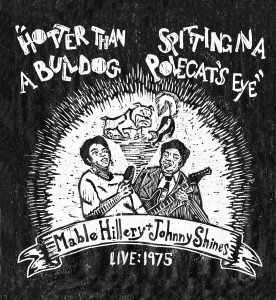
Hotter Than a Bulldog Spitting in a Polecat’s Eye
Americana Music Productions – AMP 001 (LP)
Mable Hillery was born (in 1929) and raised in a rural area of western Georgia, where she was exposed to the music of the church and the cotton fields. After moving to the coastal town of Brunswick, Georgia, in 1960, she came to the attention of folklorist Alan Lomax, through whom she was introduced to and became a member of the Georgia Sea Island Singers and thereby gained entrée to the concert stages, coffee houses and colleges of the blues “revival” circuit. By 1966, she had become involved in the Southern Folk Cultural Revival Project (SFCRP) and focused mainly on educational aspects of the civil rights movement. Although her involvement with music continued and brought her into contact with many of the music’s greats, her only album was the politically themed It’s So Hard to Be a Nigger, which she recorded for the British XTRA imprint while on tour of the UK in 1967.
Sometime in the early 1970s, Hillery met up with legendary guitarist Johnny Shines, who by that time had relocated from Chicago to Tuscaloosa, Alabama, and also had become involved with the SFCRP. After teaming with Hillery at concert gigs in Atlanta, Dallas and New York City, Shines lobbied successfully to get her on the bill for the fourth annual Miami Blues Festival in April of 1975 (the album’s title is Hillery’s comment on Miami weather), which also featured Buddy Guy, Junior Wells, Robert Lockwood Jr., Son Seals and Koko Taylor in its star-studded lineup. This album, AMP’s first, captures Hillery’s April 11 set as recorded from the festival’s soundboard. Accompanied by Shines playing amplified but without slide, she sticks to traditional blues fare in the form of Bring It on Home, Young Woman’s Blues, Four Day Creep, You’ve Got to Love Him with a Feeling (via Wells?), Bumble Bee Blues, Come Back Baby and the stunning version of Bessie Smith’s Backwater Blues that closes her set. Thanks both to Shines’ sympathetic backing and Hillery’s expressive and dynamic vocals, which show influence from contemporary blues and soul women, as well as from such forebears as Smith, Ida Cox and Memphis Minnie, these familiar songs consistently find new life and are anything but routine.
Sadly, Hillery died of a heart attack barely a year after this performance, at age 46. Thankfully, AMP has done a top-notch job on its maiden release, from the crystal clear sound of the thick slab of 180 gram vinyl to the extensive liner notes and 28-page booklet. Be warned, though—this is a limited edition of 250 copies, so if you want to get one, you better do it now.
—Jim DeKoster
LINDSAY BEAVER
Tough as Love
Alligator Records – ALCD 4986
Thirty-three-year-old Canadian Lindsay Beaver has struck pay dirt with her first release under her own name. Beaver, a jazz-trained drummer with a classically trained voice, excels in exploring early R&B, blues and old school rock ’n’ roll.
A career that has spanned 15 years with various bands was inspired by her exposure to Jimi Hendrix and Billie Holiday as a teenager, while Earl Palmer is her biggest drumming influence.
This Alligator release, Tough as Love, was recorded in Beaver’s current home city of Austin. It contains seven originals and shows off the excellent work of her touring band, guitarist Brad Stivers and bassist Josh Williams. The clarity of Stivers’ notes and his ability to handle all her changes stand out.
Too Cold to Cry has a classic sound. It’s a goodbye tale of Beaver’s tossing out a man who’s “too cold to cry.” His belongings are now outside her door. “That old bass you played doesn’t live here anymore,” she sings. Marcia Ball on piano is a welcome addition.
Sax Gordon adds pizzazz on What a Fool You’ve Been, while Dennis Gruenling sits in for Slim Harpo on the latter’s I Got Love if You Want It. “Quit teasin’ me baby. I’ll be your lover girl,” says Beaver.
Two blues songs are especially effective. You Hurt Me, conjuring Amy Winehouse, is a plea from a woman who’s begging a man to come back. “If you don’t soon return you’re gonna drive me to my grave.”
Stivers turns in an anthemic slow blues on Angela Strehli’s Lost Cause, arousing memories of Luther Allison.
Matt Farrell on rockabilly piano joins Beaver on the rousing Oh Yeah with Eve Monsees in the mix, and Laura Chavez cuts loose on the rocker Mean to Me where Beaver indicates she’s “tired of bein’ used.”
Rejecting mambo and cha-cha in the ’50s-style Let’s Rock by Art Neville, Beaver shouts, “When you’re rock ’n’ rollin’ everything’s gonna feel real good.” She’ll Be Gone, enjoying some deep bass guitar à la Peter Gunn, is a radio-ready smash.
Beaver’s voice satisfies in front of the steady pulse of her drumming.
—Robert Feuer
MARK HUMMEL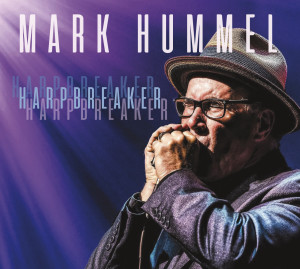
Harpbreaker
Electro-Fi – Electro-Fi 3456
Few would dare argue with the assertion that Mark Hummel is among the most talented—and consistently innovative—blues harmonica players to follow in the footsteps of the giants of the postwar era. Equally adept at both acoustic and amplified modes of performance, Hummel, who has been playing professionally since the early 1970s, has amassed a mile-long discography that includes over 20 albums as a bandleader and numerous live anthologies. His Blues Harmonica Blowout tours have become the catalyst for regional spinoffs around the country, and he was nominated for a Grammy in 2013 for Remembering Little Walter.
If all-instrumental, guitar-driven blues albums are rare, their harp-centric equivalents are even more so. Bob Corritore’s Taboo, released on Delta Groove in 2014, is a rare exception. Perhaps less familiar to blues fans stateside, Fabrizio Poggi’s Harpway 61 (2012) and Finnish harpist Helge Tallqvist’s In Footsteps (2015) are others.
With Harpbreaker, Hummel firmly stakes his claim on this under-populated territory. His own liner notes offer personal anecdotes that cut across his long career and illuminate his reasons for including some of the 13 tracks in this collection. One of the most striking is Cristo Redentor, the Duke Pearson–penned gospel-jazz instrumental that most blues fans associate with Charlie Musselwhite, who has made it a staple of his live shows for decades. Hummel’s thoughtful (and compared to Musselwhite’s version, slightly more aggressive) interpretation alternates between chromatic and diatonic harmonicas, with Kid Andersen striking an atmospheric tone with his subtle guitar work.
Little Walter deeply influenced Hummel in his formative years as a young player, as can be heard on Walter’s own Crazy Legs and other Walter-inspired tunes, from Evans Shuffle to Harpoventilatin’. The jazz numbers Señor Blues and Glide On, and a sweet, somewhat melancholic arrangement of See See Rider, diversify the set. Hummel is known for assembling top-notch studio and touring bands, and the list of musicians backing him here—Little Charlie Baty, Anson Funderburgh, Rusty Zinn, Billy Flynn, June Core and R.W. Grigsby, to name a few—is impressive.
With only five songs previously released between 2004 and 2016, even the diehard fans who own Hummel’s more recent recordings will have plenty of new material to enjoy with Harpbreaker.
—Roger Gatchet
KEVIN BURT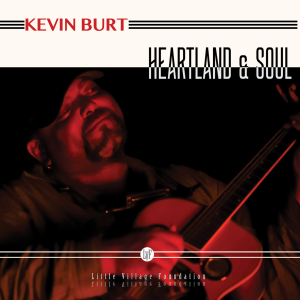
Heartland & Soul
Little Village Foundation—LVF 1025
Kevin Burt is a smooth singer from Iowa, which is not a place known for its blues. Still, Burt came, he saw and he conquered—he won the hearts of the crowd when he entered the Blues Foundation’s 34th International Blues Challenge at the Orpheum Theatre and won in multiple categories of piano, guitar, vocals and harmonica. His backing band sounds fantastic and makes Heartland & Soul a hearty and soulful effort indeed.
Day Day has a medium-up-tempo funk groove, which features some pretty nifty blues harp licks from Kevin, establishing his harmonica credentials right off the bat. Come See About Me has an R&B groove that could have fit comfortably in any of the Stax recordings. It has nice female backing vocals by Lisa Leuschner Andersen. The band is tight and so are the lyrics. Burt has a natural way of phrasing that is pleasing to the ears, and he creates the feel of someone who is performing live instead of in a recording studio. By the way, Burt’s bassist on the album, Jerry Jemmott, is an old-school veteran electric bassist who played with the likes of Ray Charles, B.B. King, Chuck Berry, Aretha Franklin, et al., and was a major influence on none other than the legendary jazz bass virtuoso Jaco Pastorius. Is there any wonder why this album sounds so great? (See this issue’s “Artist to Artist” column.)
Thank You is nicely flavored with the aroma of Booker T. and the M.G.’s, especially since it’s wrapped in that warm Hammond B3 blanket (Jim Pugh sounds wonderful here with his understated chords). This is one of the best tunes on the disc—it’s smooth and easy listening, but with a strong message of love to his family elders. Kevin’s lyrics are poignant, and especially relevant.
In the up-tempo, minor key workout Real Love, Burt’s solo reminds one of Lee Oskar from War, especially toward the end when he really lets it fly and rips it up. His singing reminds one of Gil Scott-Heron, although his voice doesn’t have as much of the baritone bottom. Still, Burt sings with the kind of confidence and passion that gets the message across comfortably.
Burt gives the Beatles classic Eleanor Rigby a fresh coat of paint—unlike any version I have heard. He serves up a downright funky dish here, but it feels effortless until you wonder why this approach hadn’t been done before. One can see this stylistic approach being a showstopper that wins any contest, hands down. His raunchy rendition reminds me of the way Bill Withers would attack a song and make it his own.
While Makin’ Me Feel is sexy slow burner, I’ve Been Watching You has a pretty funky wah-wah based clavinet part that you really ought to hear—it is reminiscent of the one Billy Preston plays on his 1971 hit Outa-Space when he was on the A&M label. I Don’t Want to See You No More finds Burt playing acoustic solo guitar on this minor blues tune, written about his woman leaving him for no apparent reason, and one can imagine this is probably another major centerpiece during his live show. The man really knows how to write and deliver a torch song.
Never is a smoldering, slow 6/8 blues—imagine being at a late-night supper club listening to Kevin deliver this love song to you live. This piece has more than a few tasty blues guitar licks from Kid Andersen, and offers an exceptional vocal performance that proves Burt can deliver a low-down blues with the best of ’em. It’s one the best vocal highlights of the disc.
On Your Smile, the touching tribute dedicated his daughter, the melody and chorus are both extremely catchy. It’s a well-crafted piece that might just bring a tear to your eye if you’re not careful. Kevin is singing his heart out on this one, and the sincerity of the lyrics comes shining through in every measure. Wake Up, Baby is an up-tempo shuffle that is the smart way to close this album—Kevin’s Iowa roots seem to shift to deep-southern roots as he chugs and strums this shuffle with energy.
Burt is a serious songwriter who knows how to craft music to fit his personality, and no one delivers this brand of music better than he does. After listening to Heartland & Soul, one should have no problem seeing why he took all the top honors at the blues competition—this guy is a real winner.
—Wayne Goins
JOE LOUIS WALKER, BRUCE KATZ, GILES ROBSON
Journeys to the Heart of the Blues
Alligator – ALCD 4987
Labors of love risk being terrific concepts that fail in execution. Say a British blues harmonica ace, a renowned Bay Area blues guitarist-singer and a Catskills pianist team up to celebrate blues of the 1930s–50s. When they’ve recorded a dozen tunes they name their album Journeys to the Heart of the Blues, a title and concept that could tag a collection that takes itself too seriously.
Fortunately, this album doesn’t. Walker, Robson and Katz use vintage blues songs as inspiration, not musical scores. Their performances are loose interpretations and have the “live” feel of master musicians at play. Given the instrumentation, it’s no surprise much of their material comes from the artists of the so-called Bluebird beat era. Big Maceo Merriweather’s Poor Kelly Blues is a standout performance, Katz’s piano and Robson’s harp driving Walker’s powerful singing of a tale of remorseless murder. Maceo is also the source of the rollicking Chicago Breakdown, essentially a showcase for Katz’s boogie piano. No one grandstands, yet everyone gets to have his say. These guys seem to genuinely enjoy one another’s musical company.
While there’s a breezy, near throwaway quality on occasion (Washboard Sam’s You Got to Run Me Down recorded by Jazz Gillum), there are also moments of high drama: their interpretation of Blind Willie McTell’s Murderer’s Home takes the song deep into Muddy Waters–Otis Rush territory, a sense of impending doom pulsing from the interplay of Robson’s harmonica, Katz’s piano and Walker’s guitar and compelling confessional vocals. Walker mainly plays acoustic guitar (albeit with pickup and some reverb) throughout, but he is an electric player at heart, which is no indictment, just an observation. He plays some fine single line leads and Muddy-inspired slide (Son Bonds’ Hard Pill to Swallow essentially becomes an homage to Muddy). Robson is much indebted to Sonny Boy Williamson II, and Katz is just a rock-solid supportive presence everywhere on piano.
Joyfully underproduced, Journeys sounds like a really good rehearsal tape, not a record. Wish that the same could be said of more contemporary blues albums! Walker, Katz and Robson effortlessly show their depth both as players and lovers of blues, choosing to reinvent songs that aren’t obvious choices to cover. Here’s hoping their exploration and collaboration continues and may inspire others to go deep, not wide.
—Mark Humphrey


